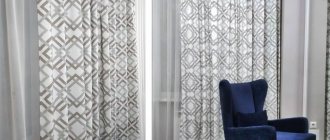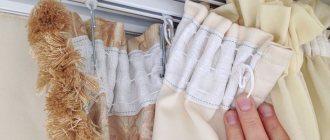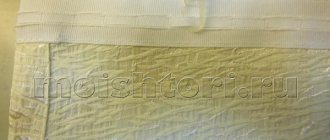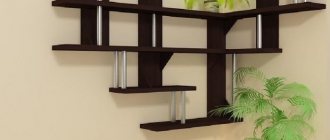Despite the fact that designers offer many interesting design options for windows, curtains are often hung on classic curtain rods, worthy models of which can be found in many on the modern product market. However, there are situations when the owners simply do not want to once again deform the wall for dowels, or the traditional fastening takes up too much space. How to hang curtains without a cornice? There are several ways, which we will discuss in our article.
When do you not need a curtain rod?
There are several types of curtains, the method of fastening of which is very far from the classic one:
- Cassette curtains,
- Roller blinds,
- Roman curtains.
Cornices are not allowed in this case. Roman blinds are especially popular; they have been known for a long time, and were originally a canvas, the height of which was adjusted using special rings. In those days there were no cornices. Nowadays rings are also used, but they differ from their predecessors.
The easiest way
If installing a curtain rod isn't an option, there's an old, tried-and-true method: nails and fishing line. You can also use screws and strong rope, it all depends on the walls and curtain materials. Light curtains are hung with just two screws and a fishing line between them. To install the curtains, special clips or alligator clips are used.
Such a simple and crude method is suitable for a quick solution to the problem, but it is unlikely to fit into the new interior and will be noticeable. Suitable for utility rooms or country houses. For temporary protection from the sun during moving or renovation, such a solution would be a good option.
Cassette and roller blinds
These curtains have a lot in common, including the fact that they are attached directly to the wall or to the frame without any additional devices. Roller blinds are usually “wound” onto a roller. They rise and fall using a special mechanism.
Important! The cassette has a box in which the curtain itself is hidden, that is, these are the same roller blinds with a closed mechanism. This significantly reduces the accumulation of dust and reliably protects the mechanism from environmental influences and various damages.
Such curtains can be of different lengths, with or without folds, but there is one common feature - the roller itself is attached, not the curtain.
Velcro
This method has its own nuances. You cannot use Velcro to hang multiple curtains or drapes made of heavy fabric. Over time, it loses its properties and products may fall. But it is quite possible to hang curtains or tulle neatly, without bulky curtain rods.
This type of installation will require a minimum set of tools and a little time. Adhesive tape can be purchased freely at any sewing store. First you need to decide on how to attach the Velcro to the wall above the window. As a basis, you can take a beam or a wooden plank, to which one side of the Velcro will be glued.
You can attach it to the wall in any convenient way, for example, with self-tapping screws. You need to calculate the number of attachment points based on the weight and number of curtains for this window. It is advisable to fasten the Velcro using a construction stapler, since the staples will securely hold the strip and will not damage its working surface.
The second half of the Velcro with pile is sewn to the curtains or curtains. The advantages of this method include the fact that it is quite practical: at any time you can easily remove curtains or tulle for washing or hang others. In this case, you don’t have to bother with cornices, hooks, etc. The obvious disadvantages include unreliability.
After some time, the mount will gradually lose its sticky properties. This will happen especially quickly under the weight of the curtains. Of course, you can replace old Velcro with new ones at any time, but this is extra work and time.
Aesthetically, Velcro fastening can look very beautiful, especially in an ascetic interior. The wooden strip is almost invisible, because it is attached to the inside of the window opening.
When is a cornice needed?
There are situations when it is simply impossible to hang curtains without a curtain rod:
- if the curtains are made of very heavy fabric;
- if the curtains are to the floor;
- if the curtains must be moved apart.
Important! Much depends on the style of the room. For classics, preference is given to heavy drapes with curtains, while minimalists may well be content with light roller blinds. For a Provencal-style kitchen, light curtains are made on the eaves, and loft fans can afford any items at all, as long as they are in harmony with each other.
What to consider when hanging?
It’s easy to get lost in the variety of accessories. Sometimes curtain rod manufacturers make the task easier and sell the fasteners as a set. Sometimes they are part of the curtains, but in some cases they need to be selected separately. When figuring out how to hang curtains on a cornice, you need to take into account:
- cornice design;
- density and weight of panels;
- material, size and appearance of fittings.
For telescopic and rod curtain rods, eyelets, rings and fastenings made of fabric are suitable: loops, ties, rocker panels. These structures have a circular cross-section, only the rod ones are fixed to the wall using brackets, and the telescopic ones are mounted between two walls. They consist of two plastic or metal pipes nested inside one another. Cornices of this type are quite noticeable and should be in the same style as the curtains. Tubular and rod structures are highly durable and will withstand heavy panels. And for thin translucent ones, on the contrary, they seem too massive.
Materials to use
To hang these curtains without a cornice, you will need:
- hooks for clothes or figured holders;
- universal glue;
- roulette;
- pencil;
- braid;
- sewing machine.
There are two methods of point fastening:
- with rail;
- without slats.
Important! In the first case, a wooden strip is nailed parallel to the top edge, and there are already hooks or holders on it. In the second method, hooks are hung directly on the wall. If the curtains are heavy, then the first option is more convenient, especially if you choose holders that are not glued, but screwed or stuffed. At the dacha or balcony you can use hooks with suction cups.
Using hooks
Buy hooks or original holders of the right size; they should be reliable and harmonize with the chosen interior style.
Calculate the correct distance between them so that the canvas does not sag, forming unplanned folds. Firmly fix the selected holders above the window opening.
On the curtain itself, be sure to sew longitudinal ribbons or make loops. This will allow you to hang it easily and securely.
This point fastening is ideal for decorating windows of non-standard and arched shapes; this is the case when it is unrealistic to install a regular cornice.
There are also disadvantages to this method of window decoration - the curtain does not move. But it can be easily solved with the help of side grabs, which will help not only let the sun's rays into the room, but also add zest to the interior. After all, they can be designed in a very original way, giving the curtains themselves a bizarre shape.
Preparing curtains
When asking yourself how you can hang curtains separately from the curtain rod and choosing your mounting method, prepare the curtains first. You need to sew neat loops along the top edge.
Option 1:
- Think about the distance between the loops.
- Measure the width of the curtains.
- At the top edge, measure the appropriate distance and make a dot or stitch.
- Mark the remaining openings in the same way.
- Make a loop of soutache just above the edge.
- Make loops at the markings and then stitch them.
The art of drapery
Drapery - one-sided, counter or bow folds on the curtain. Few folds are made on thick tulle, and thin fabric is draped with frequent and narrow folds, and work done by hand lasts longer.
Using tiebacks, staples, rings, and sometimes thread, horizontal and vertical draperies of bizarre shapes are created.
Tip: when planning drapery, you will need to take fabric 1.5-3 times wider than the length of the cornice and purchase a special ribbon with loops in 2-3 rows.
To drape the bottom of a light curtain, the edge is raised in 1-3 places to the desired height and fastened to the canvas.
To create a classic wave, 1-2 sags are formed on the inner edge of the curtain.
More: Electrical installation in the house - what is important?
If you intercept the middle of the curtain or the top and bottom, you will get an elegant “column” or “vase”.
By draping in one-way folds, the vertical waves of the fabric are laid to one side.
To create counter folds, every two folds face each other.
Bow folds are formed by folding two folds inward from the outer sides.
Distributing the fabric in uniform vertical ridges, the curtain is decorated with pencil folds.
Complex Flemish folds. A braid with two rows of loops is taken and the upper and lower threads are simultaneously pulled together, creating a knot similar to a V. The bottom of the resulting fold is strongly pulled together, maintaining the expressiveness of the upper gather.
The weighted bottom of the curtains will help maintain drapery.
For this use:
- weight tape;
- embroidery at the bottom of the curtain with rhinestones, threads, sequins or beads;
- lace inserts.
Marking the cornice
This procedure is very dependent on whether there are folds in the fabric. The place under the hooks for Roman blinds can be marked immediately - the distance on the wall or rod will be exactly the same as on the curtain itself. If you want to hang regular hanging curtains, it is more convenient to do it as follows:
- Distribute a straight line across the floor (you can even lay a thread, for example).
- Position the curtain so that the top edge lines up with the line.
- Fold the pleats.
- Make a mark on the line where the loops are located.
- Measure the distance between the marks.
Fashion trends
Classic will never go out of style. Even ordinary, plain tulle will look organic if you choose the right fastenings and accessories. The bright design of the room is perfectly complemented by this year’s new product – tulle with photo printing. At the same time, it is not at all necessary to choose fabric with a pattern from the catalog. You can order printing from one of the companies at your own discretion.
Photocurtains are a strong element of the interior that takes on all the emphasis. A large pattern goes well with plain wallpaper.
To decorate a hall in a high-tech style, tulle in combination with muslin (thread curtains) is suitable.
Tulle goes perfectly with curtains of various textures. But at the same time, two components should be chosen at the same time, since they must match each other in color and shape. Synthetic tulle should not be combined with natural fabrics.
Advantages and disadvantages of point fixation
If the hooks fit tightly enough, you can hang any curtains on them. For example, curtains, drapes on the sides, lambrequins - and all this with the same fastenings.
The holders themselves can be very effective.
In addition, this method of fastening allows you to beautifully decorate a window of the most bizarre shape, be it an arch or a dormer window.
Important! As for the disadvantages of this method, there is only one. You won't be able to open the curtains.
How to hang tulle: features
To hang tulle beautifully, you need to take into account the features of the space. For example, lambrequins and multiple waves would not be appropriate in the kitchen. For a small room, it is better to use light-colored material that will visually enlarge the space. If there is a balcony door in the bedroom or living room, the fabric should not interfere with its access. Let's look at each room separately:
- Kitchen: to decorate a window in the kitchen, a telescopic or rod cornice and tulle up to the window sill are suitable. You can choose fabric loops as accessories. Thanks to this solution, small fittings do not have to be cleaned of grease and soot.
- Bedroom: multi-layer compositions, which can be mounted on a baguette or ceiling cornice, add coziness and warmth. Curtain tape will help to drape the tulle.
- Hall: the design of the living room or hall can be anything. If there is no clear line or concept in the interior, it is better to use pastel-colored fabrics and accessories that will not be pretentious, but will simply complement the organic image.
It is worth remembering that there are no universal rules on how to hang tulle beautifully. There are only recommendations.
Textile clasp
Despite the fact that the curtain rod remains the most popular way to attach curtains, it still irritates many. Owners of some models have to constantly climb on the window to fix the clamp or move apart the rings, which themselves do not want to move. If you don't like all this, try a contact textile fastener, often called Velcro in everyday life.
If you have a question about how to hang curtains without a curtain rod, this hanging method is designed especially for you.
Important! The advantage of this method is that the curtains can be hung anywhere - on the wall or on the frame.
String
This is an excellent solution, which is distinguished by its minimalism and ease of installation. Great for the style of the same name, as well as country and shabby chic. A string is a thin wire. Which is stretched between two holders. It is almost invisible, so you get the feeling that the curtain is simply floating in the air. The string can also be used when the room has low ceilings. In this case, ordinary cornices additionally clutter the space, creating a pressing effect. To tension the string, it is enough to provide two fixation points for it on the sides of the window. They can be hooks, screws or special fasteners.
The installer is faced with the task of creating a strong tension on the string. This is necessary to prevent the curtain from sagging in the middle. For particularly heavy canvases, you will need to use an additional supporting element in the middle, which can be hidden behind the back. The curtain on the string can be fixed in various ways. These can be small overcast holes or rings with hooks. You can also use hidden fastenings in the form of hooks that are sewn to the wrong side. After fixing the curtain, the fishing line and hooks are completely hidden.










